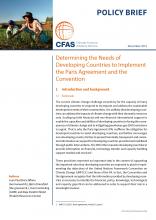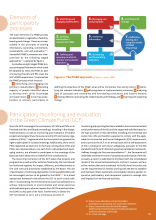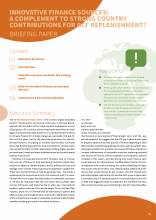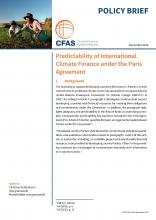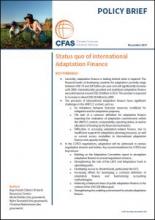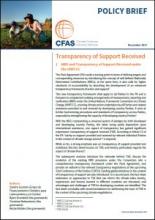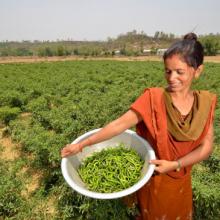Publications / Policy Papers
Many described the outcomes of 15th Conference of the Parties (COP15) in Copenhagen as insufficient or even disastrous. However, amid them, the agreement to provide USD 100 billion annually in climate finance by 2020 was heralded as an achievement. It is one of the few memorable positives for the 2009 conference, which…
>>>
The current climate change challenge exceeds by far the capacity of many developing countries to respond to its impacts and address the sustainable development needs of their communities. It is unlikely that developing countries can address the impacts of climate change with their domestic resources only. Scaling-up both…
>>>
Monitoring and evaluation (M&E) has involved external experts or stakeholders measuring performance of a project or an activity against preset indicators, using standardized procedures and tools. However, with growing emphasis on participatory approaches towards development, there has been recognition that M&E should also be inclusive…
>>>
The Green Climate Fund (GCF) is the world’s largest dedicated fund for climate action. By the end of this year it will have distributed all USD 10.2 billion of its initial resource mobilisation to over 102 projects in 97 countries, and we hope have raised twice as much again in…
>>>
Ex-ante communication of climate finance is expected provide developing country Parties with the necessary certainty to plan for their low-carbon, climate-resilient development pathways. However, providing such information well in advance comes with certain challenges, deriving from the quite diverse nature of national budgetary processes.…
>>>
The need to invest in adaptation rests upon the assumption that ‘anticipated risks or experienced impacts of climate change require action to ensure the safety of populations and the security of assets, including ecosystems and their services’. The outcomes of UN climate negotiations, including the Paris Agreement, are continuously urging for…
>>>
The Paris Agreement (PA) marks a turning point in terms of defining targets and corresponding measures by introducing the concept of self-defined Nationally Determined Contributions (NDCs); at the same time, it also calls for higher standards of accountability by launching the development of an enhanced transparency framework of action and…
>>>
Many UNFCCC stakeholders see climate finance as one of the linchpins holding together the entire international climate policy process, for several reasons. First, the provision of climate finance to developing countries is an obligation developed countries have both under the UNFCCC and the Paris Agreement. Fulfilling this obligation builds…
>>>
The Green Climate Fund (GCF) made significant progress in 2014. By the end of the year, donor governments had committed an initial US$10.2 billion. Half of this sum will be devoted to adaptation, making the GCF the biggest multilateral adaptation finance institution in the world. The GCF’s first decisions on use of the funds are due to be taken…
>>>
Governments discuss and negotiate common goals around the causes and consequences of climate change under the United Nations Framework Convention on Climate Change (UNFCCC). Since 1992, industrialised countries have pledged new and additional funding to developing countries to help them meet their climate-related obligations, as stipulated by…
>>>

